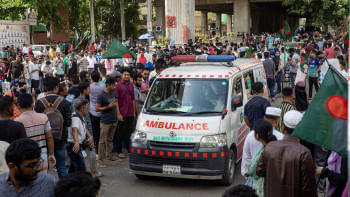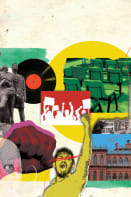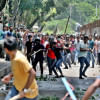The dark underbelly of student politics in medical colleges

Student politics, once a substratum in shaping the national political landscape, has become a source of distress for the current generation. Some argue that this tectonic shift is due to a lack of patriotism among today's youth. However, the student-led protests against a quota system for government jobs, which broadened into a movement against the 15-year autocratic regime and even succeeded in toppling it, suggest otherwise. The real issue lies elsewhere as student politics has become tainted over the past few decades, losing the integrity it once held.
The brutal torture by Bangladesh Chhatra League (BCL) cadres at Chattogram Medical College (CMC) in 2011 which led to the death of fourth-year student of Dental Surgery Abidur Rahman, the murder of Biswajit Das in 2012, and the killing of Abrar Fahad, a second-year Bangladesh University of Engineering and Technology (BUET) student in 2019 are some of the most extreme outcomes of violence perpetuated by student political factions across institutions.
On February 8, a group of BCL activists tortured four students at Chattogram Medical College (CMC) hostel, with two requiring ICU treatment. The CMC academic council later suspended seven BCL activists.
"The apparent cause was to label the tortured students as Chhatrashibir, the student wing of Jamaat-e-Islami, to exert dominance over the other lobby," said Shabab*, a student at CMC. He added, "After Aqib bhai (Mahadi J Aqib) was fatally injured during a BCL factional clash in 2021, campus politics was officially suspended, but activists continued their practices through two separate lobbies." Describing the February 8 incident, he added, "The hostel's room 17/A had earned itself a reputation as the torture cell of the CMC hostel."
A similar factional clash occurred on May 1 at Shaheed Ziaur Rahman Medical College, Bogura (SZMC). "The central BCL committee announced the members of the newly formed SZMC unit, favouring the President's lobby. The General Secretary's lobby chose to remain apolitical, yet members of the other lobby attacked and vandalised general students due to clashes in the past. This led to a casualty where a second-year student named Afrazem was stabbed. He was gravely injured, and we rushed him to the emergency room before he was later taken to the operation theatre for surgery," recounted Ayaz Wasif*, a student at SZMC.
This influence isn't just limited to direct harm to students, however.
Sadman Sakib*, a former BCL activist and a student at Dhaka Medical College (DMC), shares his experience, "I had no interest in politics, yet I was forced to join one of the lobbies as soon as I was admitted to the medical college, just to secure a hostel seat. We were compelled to participate in political processions and post about them on social media. Owing to my association with the political faction, I secured a room for myself along with two of my batchmates, even though such rooms typically house four to five students."
He then detailed the day he decided to leave BCL, "On July 16, students were peacefully protesting at TSC against the quota system. Our seniors planned to forcibly take us there, chanting BCL slogans. I was deeply uncomfortable, but they wouldn't let me leave. I managed to slip away, and fled home, leaving my belongings behind. That day, I vowed never to be part of such rogue acts again. After leaving the party and showing solidarity with the movement, I received death threats from local BCL activists and those at my college."
The pressure to join a lobby is just as strong for female students. "We got hostel allotments through political connections. After I protested ragging, I was verbally abused by seniors, which took a toll on my mental health," says Tasnia Haque Achal*, a student at DMC.
"The rampant misuse of power has long been ingrained in the actions of politically active students, resulting in unnerving incidents across various institutions, including medical colleges. While some cases surface, many remain hidden. For an institution to function effectively and safeguard the rights of its general students, I believe it requires a completely apolitical student body. It's time to ban all forms of student politics in medical colleges that are tied to national political parties," quotes Naveed Shehriar, a student at Ibrahim Medical College.
The countless experiences that have gone unnoticed are just a glimpse of the dark reality. Corrupt student politics has been perpetuated by a handful of miscreants who abuse their power with impunity. It is only when the situation escalates to murder that they are finally brought under the law. Most medical colleges have recently banned politics on campus, while others are in the process of doing so. However, the pressing question remains: can we truly safeguard the student community from such continued brutality?
*Names have been changed upon request
Purna is a second-year medical student at Shaheed M. Monsur Ali Medical College, Sirajganj. Send her e-mails at: [email protected]

 For all latest news, follow The Daily Star's Google News channel.
For all latest news, follow The Daily Star's Google News channel. 










Comments